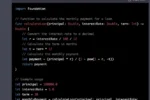Have you ever wished you could easily keep track of your money without getting overwhelmed? Meet ChatGPT, a helpful tool that can assist you in creating your very own budget! While it’s great at making simple budget templates, it does have some challenges with tricky calculations and protecting your personal information. In this exciting adventure, we’ll explore how I used ChatGPT to set up my budgeting tool, discover its strengths and weaknesses, and learn how it can help you save money and understand your spending better—all while keeping things simple and fun!
| Feature/Aspect | Description |
|---|---|
| Basic Budgeting Tool | ChatGPT can create basic budget templates and assist with income tracking and spending insights. |
| Limitations | ChatGPT struggles with complex calculations, lacks real-time integration with financial accounts, and raises privacy concerns. |
| Prompting Example | Users can prompt ChatGPT to create tables, modify currency, and input data for budget tracking. |
| Refinement | Users can refine budget templates by adding columns for months and opening balances. |
| Spending Trends | ChatGPT can identify spending trends through simple English prompts, differentiating it from basic spreadsheets. |
| Savings Goals | ChatGPT can help create savings plans and suggest strategies to achieve them. |
| Scenario Planning | Users can simulate different financial scenarios, though results may require adjustments. |
| Privacy Risks | Sharing financial data with ChatGPT poses privacy concerns as information is processed on external servers. |
| Conclusion | While not a replacement for dedicated budgeting apps, ChatGPT provides valuable insights and functionality. |
Using ChatGPT for Budgeting Basics
ChatGPT can be a helpful starting point for creating a budget. By simply asking it to make a budget template, users can get a basic structure that can include income tracking and spending categories. This makes budgeting easier for beginners who might feel overwhelmed by complex financial terms. The initial template is like a blank canvas, allowing users to fill in their own information to see where their money goes each month.
However, it’s important to remember that while ChatGPT can generate these templates, it doesn’t handle complicated calculations very well. Users might still need to double-check their figures. The AI also doesn’t connect to bank accounts, so everything must be entered manually. This means that although it’s a good tool for starting, users should be careful and make sure their data is correct.
Exploring Spending Trends with ChatGPT
One of the exciting features of using ChatGPT for budgeting is its ability to identify spending trends. By asking questions in simple language, users can discover patterns in their spending habits. For example, if someone wants to know how much they spend on entertainment each month, they can prompt ChatGPT for insights. This feature can help people become more aware of their financial habits.
While ChatGPT can provide valuable insights, it does have limitations. The accuracy of the trends depends on the data inputted by the user, which may not always be comprehensive. Additionally, users should remember that ChatGPT cannot replace a financial advisor. Still, it offers a simple way to examine spending habits and can guide users in making better financial decisions.
Understanding Privacy Concerns with ChatGPT
Using ChatGPT as a budgeting tool raises important privacy concerns. When users input personal financial information, they need to be cautious about sharing sensitive data. Unfortunately, the AI processes this information through its servers, which may lead to potential privacy risks. For this reason, it’s best to avoid entering any personally identifiable information.
In light of these concerns, users can still benefit from using ChatGPT for budgeting by sharing general information instead. For instance, discussing budgeting strategies or savings goals without sharing specific numbers can help maintain privacy. By being mindful of what information is shared, users can still leverage ChatGPT’s capabilities without compromising their financial security.
Understanding the Basics of Budget Templates
Creating a budget template is essential for managing personal finances effectively. A budget template serves as a structured framework where you can track your income and expenses, helping you to visualize where your money goes each month. This visibility is crucial; it allows for informed decisions about spending and saving, ensuring you stay on track to meet your financial goals.
When using ChatGPT to generate a budget template, it’s important to start with a clear understanding of your financial situation. By inputting accurate data regarding your income sources and regular expenses, you can create a foundation for your budget. The versatility of ChatGPT allows for easy adjustments, making it a useful tool for anyone looking to customize their budgeting approach.
Maximizing ChatGPT’s Budgeting Features
To get the most out of ChatGPT’s budgeting capabilities, it’s essential to leverage its features strategically. For instance, you can ask it to generate various budgeting scenarios based on different income levels or expenses. This flexibility can help you prepare for potential financial changes, allowing you to explore different budgeting strategies without extensive manual calculations.
Additionally, utilizing simple, clear prompts can enhance your interactions with ChatGPT. For example, requesting a breakdown of monthly expenses or asking for savings strategies in plain language can yield more effective responses. This ease of communication not only simplifies the budgeting process but also engages you in a more productive financial dialogue.
Navigating Privacy and Security Considerations
While ChatGPT offers valuable budgeting assistance, it’s crucial to remain vigilant about privacy and security. Sharing sensitive financial information with AI tools can pose risks, as your data is processed on external servers. To safeguard your information, avoid entering personally identifiable details and focus on general financial concepts instead.
Implementing good practices, like exporting your data to a secure spreadsheet once you’ve completed your budget, can further protect your information. This way, you retain control over your data and can keep it private while still benefiting from the insights generated by ChatGPT.
Combining ChatGPT with Traditional Budgeting Tools
Although ChatGPT can assist in creating a budget, it is often best used in conjunction with traditional budgeting tools. For instance, exporting the budget template to a spreadsheet allows for more detailed analysis and integration with financial software. This combination can enhance accuracy and provide a more comprehensive overview of your financial health.
Moreover, using ChatGPT for initial insights and then refining them with dedicated budgeting applications can lead to more effective financial planning. These applications often come with features such as real-time tracking and alerts, which are beneficial for maintaining a budget over time. Combining these resources can help streamline your budgeting process.
Frequently Asked Questions
What is ChatGPT and how can it help with budgeting?
**ChatGPT** is an AI tool that can assist you in creating a **budget**. It helps track income, plan savings, and analyze spending patterns using simple commands.
Can I create a budget template with ChatGPT?
Yes! You can ask ChatGPT to create a **budget template** by entering your income and expenses. It can set up a table to help organize your finances.
What are the limitations of using ChatGPT for budgeting?
ChatGPT has some limits: it can’t **connect to bank accounts**, may make **calculation errors**, and could raise **privacy concerns** since your data is processed online.
How does ChatGPT identify spending trends?
ChatGPT can spot **spending trends** by analyzing your budget data. You just need to ask it questions in plain English, and it will provide insights.
What should I avoid sharing with ChatGPT?
Avoid sharing **sensitive information** like your full name, bank details, or personal ID when using ChatGPT, as it can raise privacy risks.
Can ChatGPT help me set savings goals?
Absolutely! You can ask ChatGPT to create a **savings plan**. It can suggest strategies and even make a table showing how to reach your savings goals.
How can I improve the results I get from ChatGPT?
To get better results, use **clear and specific prompts**. This helps ChatGPT understand your needs better and provide more useful responses.
Summary
The content discusses the use of ChatGPT as a personal budgeting tool, highlighting its capabilities and limitations. It explains how ChatGPT can create simple budget templates, track income, and identify spending trends, but lacks real-time integration with financial accounts and raises privacy concerns. The author shares their experience refining a budget template, testing its functionalities, and generating savings plans through plain language prompts. Despite its potential, the content emphasizes the drawbacks, such as manual data entry and possible calculation errors. Overall, it illustrates the practical use of AI in budgeting while acknowledging its constraints.







